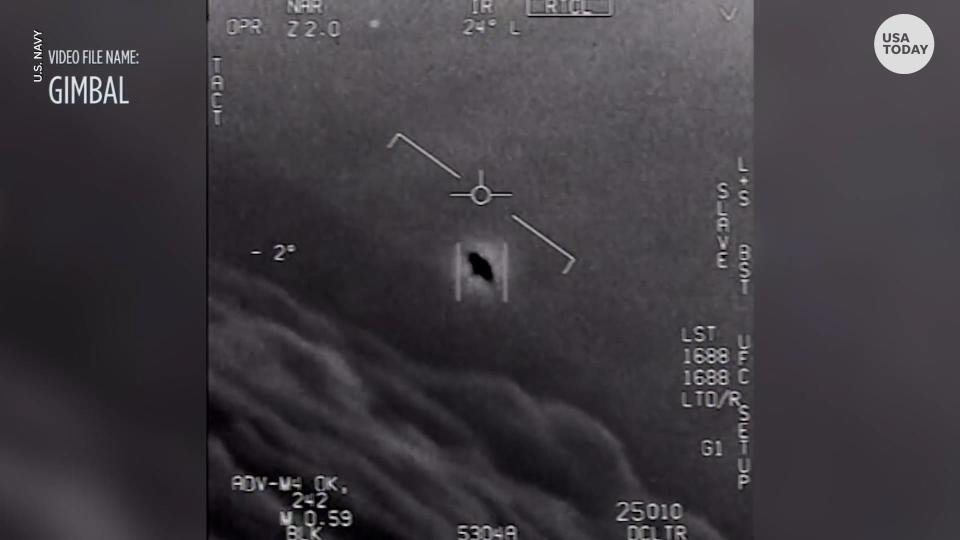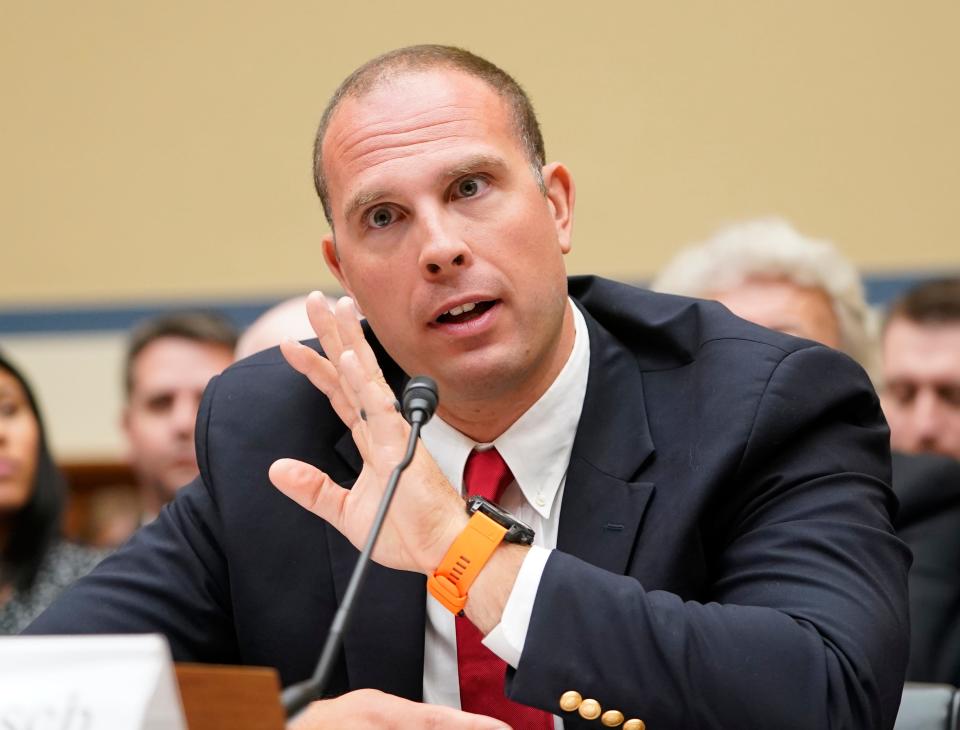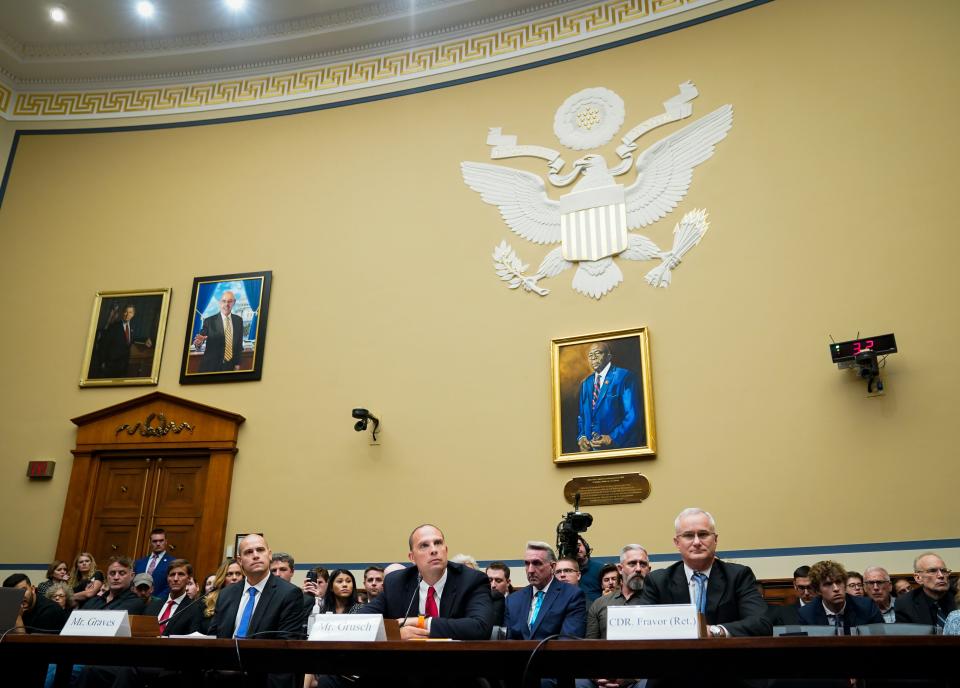From conspiracy theories to congressional hearings: How UFOs became mainstream in America
Across a storied 45-year career as a New York Times staff reporter, Ralph Blumenthal had extensively covered weighty topics like the Italian Mafia and Nazi war criminals. But never suspected alien spaceships.
That changed in 2017 when Blumenthal, by that time a retired contributor for the Times, connected with investigative journalist Leslie Kean, who had come across an extraordinary tip.
Kean, who has long reported on UFOs, was able to attend a confidential meeting that October where she learned of a top-secret Pentagon program that had for years operated in the shadows. Its mission? To investigate reported sighting of mysterious objects in the skies.
The discovery was monumental, not least because it directly undermined the government's public position of more than 50 years that unidentified flying objects were not worth studying.
Naturally, Blumenthal was intrigued.
“The government always took the position that there’s nothing to this, that these are all hoaxes or hallucinations, but nothing real," Blumenthal told USA TODAY in a phone interview. “This was a pretty good story, I thought – a great story.”
'We have no explanation': See list of US states with the most reported UFO sightings
New York Times article sets the stage for more revelations
Blumenthal's hunch was right.
Published two months later, the now-famous article uncovering the top secret program headlined "Glowing Auras and ‘Black Money’" marked a turning point in the ever-evolving public discourse surrounding UFOs.
Reported UFO sightings have long attracted as many skeptics as they do fanatics. But for those with doubts, there it was in black and white on the front page of one of the nation's preeminent newspapers: The Pentagon had for years thought that reports of craft flying in strange ways were so serious as to merit millions of dollars in funding to study.
"We happened to capture the moment of interest and did change the dialogue" - Ralph Blumenthal
What the Times' reporters exposed spread like wildfire, helping to set in motion a series of additional revelations, government hearings and even UFO documentaries that recently culminated in July in some jaw-dropping testimony before Congress about a spaceship crash retrieval program. This week, the Pentagon's new office to investigate UFOs unveiled a new website where the public can access declassified information about reported sightings.
In the years since the Times' article appeared, the harrowing experiences shared by Navy pilots and the revelations exposed by government whistleblowers have continued to lend legitimacy to a topic once confined to the realm of conspiracy theory. Long considered taboo, discussion of UFOs (and the potential interstellar lifeforms many believe could be piloting them) has now entered the mainstream as the push for government transparency strengthens.

“I do think we at The New York Times ... did open doors that had long been closed,” Blumenthal said. “I do take great pride in that, that we happened to capture the moment of interest and did change the dialogue."
NASA issues UFO report: Why the space agency hopes to shift UAP talks 'from sensationalism to science'
Intelligence officials go public
But the team of reporters couldn't have done it alone.
Growing disillusioned with the obstinance he faced among the high ranks of the government, Christopher Mellon in 2017 joined a small group of former government officials with security clearances who went public with some of what they knew.
Mellon and others had become concerned over the threat to national security posed by craft routinely observed in U.S. airspace moving in ways beyond the capabilities of any known human technology. Additionally, no central mechanism existed to report and document these sightings of UFOs, which have recently been rebranded as UAP for unidentified anomalous (or aerial) phenomena.
"We felt it was essential from a security and national defense standpoint to alert the system and wake people up" - Christopher Mellon
So Mellon, a former deputy assistant secretary of defense for intelligence, turned to the press. He was joined in his efforts by Luis Elizondo, a former military intelligence official who resigned and went public in October 2017 after 10 years of running the Pentagon program.
“We just knew our pilots were encountering some very bizarre craft," Mellon told USA TODAY in a phone interview. "We felt it was essential from a security and national defense standpoint to alert the system and wake people up.”
Using unclassified documents and on-the-record interviews with former intelligence officers, Blumenthal, Kean and Times' Pentagon correspondent Helene Cooper were able to expose the Defense Department's secretive Advanced Aerospace Threat Identification Program. The bombshell article even included with it the release of videos showing the Navy's encounters with strange objects.

Before The New York Times agreed to the story, Mellon and Elizondo had also joined the commercial venture To the Stars Academy of Arts and Science, a San Diego-based company co-founded by Blink-182 frontman and guitarist Tom DeLonge.
At its outset, the company had both an entertainment and now-defunct research arm and was instrumental in the production of the History Channel docuseries "Unidentified: Inside America's UFO Investigation," which chiefly featured Mellon and Elizondo in its two-season run between 2019 and 2020.
“We decided we're going to make this known, we’re going to tell people this is real,” co-founder Jim Semivan, a retired operations officer with the CIA, told USA TODAY.
'They touched my face': Actor Goldie Hawn recalls encounter with aliens while on Apple podcast

UFO lore extends back decades
Semivan's interest in studying the UFO phenomenon extends back 40 years, and includes one sighting of his own in the 1990s that he declined to describe.
Ever since Allied pilots would see so-called foo fighters in the skies over both the European and Pacific theaters during World War II, Americans have for decades been equally captivated by and skeptical of tantalizing reports of flying saucers and little green men visiting Earth.
The Air Force seemed to close the doors on further government study of the phenomenon in 1969 when it shut down Project Blue Book, declaring in no uncertain terms that any reports of UFOs were either hoaxes or misidentified natural occurrences. But many wondered, did the Cold War era program uncover and subsequently cover up the discovery of objects beyond human control, representing a potential threat?
“There’s no way it’s Chinese, it isn’t Russian and it sure as hell isn’t ours because these craft, we’ve been seeing these things for 80 years,” Semivan said. “What we have here is something very odd and very unusual.”
Alien technology on Earth? Metallic spheres found on Pacific floor are interstellar in origin, Harvard professor finds
Fallout from the July hearing
In 2020, the Senate Select Committee on Intelligence adopted Mellon's proposal to seek an official report on UAP from the intelligence community. The resulting preliminary assessment released in June 2021 identified 144 military UAP encounters since 2004, a figure which Mellon said has since jumped this year to more than 500 military UAP reports.
The findings are in part what Mellon said spurred Congress to establish the All-domain Anomaly Resolution Office (AARO) focused on receiving and analyzing unidentified phenomena reports, many of which have come from military pilots.
The developments seem to have solved the concern of Mellon and others of craft flying unchecked and unreported through military airspace. But now another issue has arisen: In June, a decorated former combat officer by the name of David Grusch came forward to claim, without presenting evidence publicly, that crafts of non-human origin have crashed on earth and been retrieved by the government for study.

Though Grusch's interview with NewsNation went viral, it was Blumenthal and Kean who once again had the story first. Days earlier, the pair broke the news with Grusch's wild claims about the Pentagon's covert crash retrieval program in an article in The Debrief, a news site focused on coverage of technology and national defense.
The Pentagon has repeatedly denied the existence of such a program.
Grusch, a member of a previous Pentagon task force that investigated UAP, repeated the claims on July 26 before a House Oversight subcommittee, which he said was based on interviews he did with 40 witnesses, many of whom he said are still working in the program.
During the two-hour hearing, Grusch was also joined by two former Navy pilots, Ryan Graves and David Fravor, whose own account of the the now-famous a Tic Tac-shaped object captured on video in 2004 during a flight off the coast of Southern California has become the stuff of legend among the UFO community.

Legal constraints may limit what Grusch is able to discuss publicly about alleged classified programs without, but Mellon and Semivan both said they found his testimony to be credible.
“A claim as extraordinary as that requires exceptional, extraordinary proof," Mellon said. "Yet, there is clearly a substantial basis for these claims. The immense national security and scientific implications warrant additional congressional investigation.”
Following the hearing, three Republicans and one Democrat on the House subcommittee sent a letter to House Speaker Kevin McCarthy, R-Calif., calling for the establishment of a select committee to investigate UAP further.
Netflix UFO series: 'Encounters' docuseries explores reported mass UFO sightings
Astrophysicists caution hasty conclusions of 'aliens'
However, many astrophysicists caution the public from jumping to the conclusion that any unexplained sighting means aliens on other planets are visiting us. During NASA's UAP hearing earlier this year, experts were clear that even otherworldly explanations aren't likely even in the absence of a natural explanation.
"We must be careful to not inject 'aliens' every time we encounter something we don’t understand," David Kipping, an astronomer at Columbia University, told USA TODAY in an email. "Faced with ambiguous evidence like this, our brains tend to fill in the gaps with whatever we’re culturally pre-conditioned to expect."
“What it actually is I think is anybody’s guess" - Jim Semivan
Semivan readily admits that the phenomenon doesn't fit into the scientific method; it's unpredictable, it has no agreed-upon vocabulary, "yet it's very real," he said.
“What it actually is I think is anybody’s guess,” Semivan said.
Both Mellon and Semivan anticipated that as bipartisan supports mounts for the military and executive branch to reveal what they know, the public will grow increasingly open and accepting of the idea that UAP – whatever they are – are out there.
“It’ll get increasingly difficult to deny that there are intelligent vehicles doing things that we ourselves cannot do in the atmosphere," Mellon said. “I think these kind of changes always take time, and I'm talking about a sea change in our worldview, of our understanding of the universe and our place in it.”
Eric Lagatta covers breaking and trending news for USA TODAY. Reach him at [email protected].
This article originally appeared on USA TODAY: UFOs, UAP and the US government: A match years in the making now open
